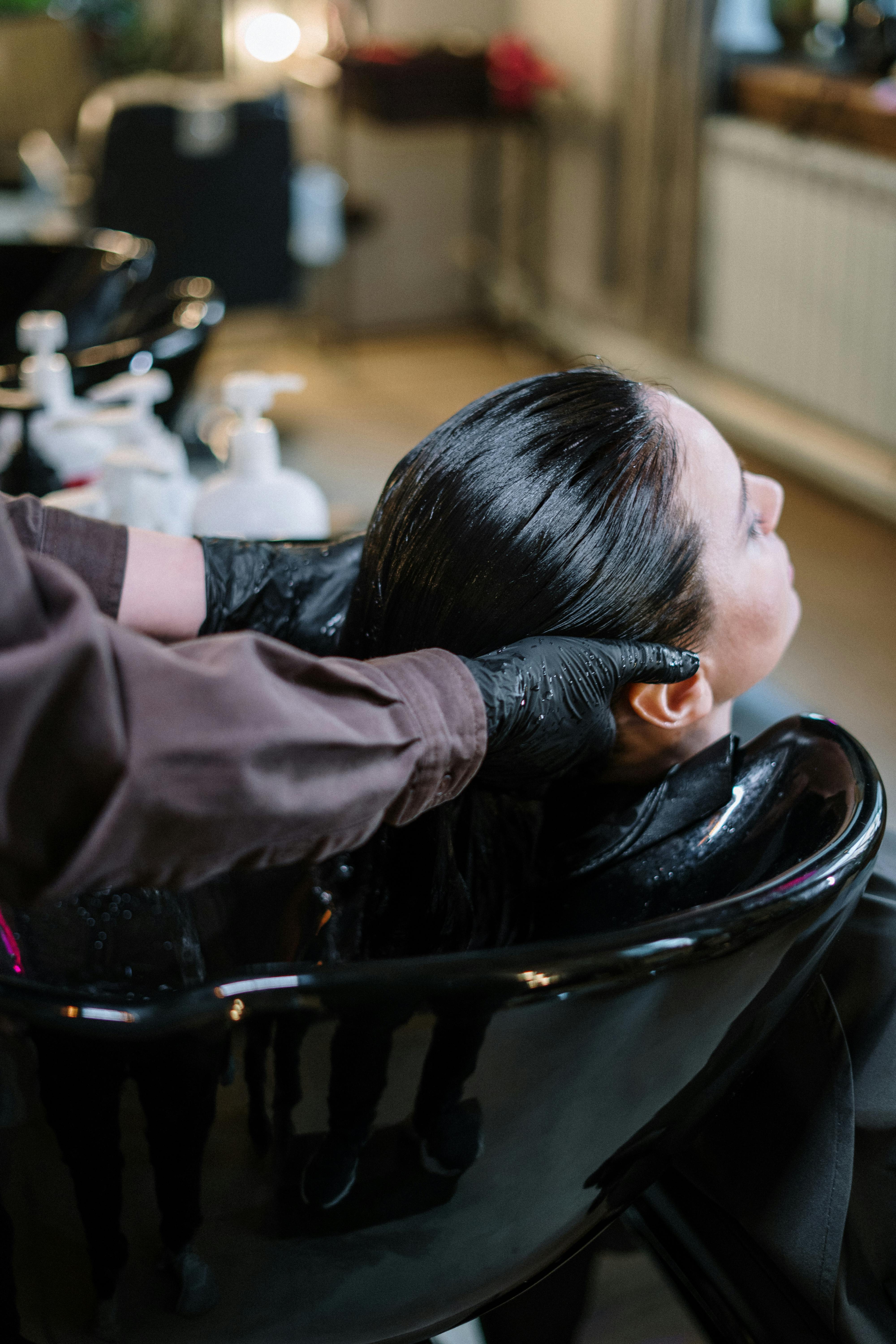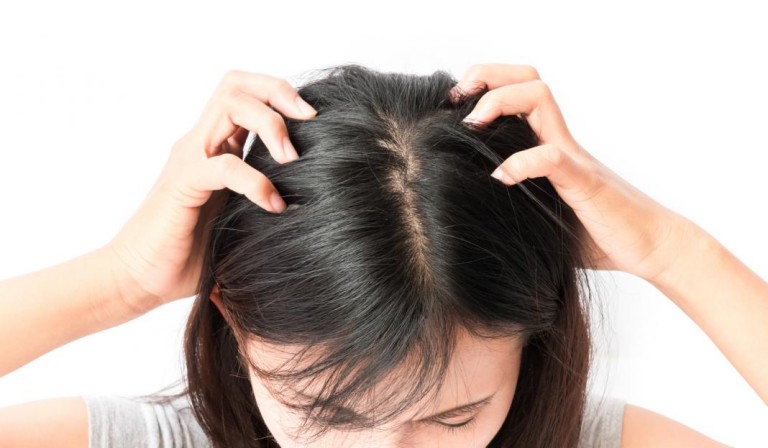
Recognizing the Signs of Infrequent Washing
There isn’t exactly a rule for hair washing, but it’s always best to avoid leaving it unwashed for an extended period. Although the number of washes should adjust to your hair’s health, life and scalp needs, knowing when your hair feels unhealthy is most important. In this article, we will look at the first Six signs you could be not washing your hair enough and how fixing these helps your hair.
Scalp and Hair Symptoms to Watch
1. Greasy Hair and Scalp: Oily roots and dull hair happen when you don’t give your scalp regular cleansing. For people with a naturally oily scalp, the sebaceous glands operate more than usual. For certain individuals, greasy hair appears sooner after skipping a wash, whereas others might not notice it until a different time. Still, the buildup of grease changes the outside appearance and might also leave you with a noticeable scalp odor that comes from the mix of sebum and germs in the scalp.
In addition, using too much dry shampoo can make the problem worse. Dry shampoo may make your hair look clean, but it doesn’t remove the dirt, grime or oils from your head. Instead, using it regularly may make your hair feel even weighed down over the weeks. Try using an oil balancing shampoo and see if that helps settle your oily scalp issues.

2. Dandruff Formation: Even though dandruff may not be caused by not washing the hair regularly, excess oil, dirt and shed skin on the scalp can lead to troubles. Most of the time, sebum builds up because Malassezia yeast grows quickly in it. Not cleaning the scalp properly causes the yeast to multiply which causes discomfort, more rapid skin turnover and flakes.
To stop these flakes, use a shampoo made for anti-dandruff that addresses what causes them. Frequent scalp cleaning helps reduce the amount of sebum and prevents too many microorganisms which supports a healthier scalp. Also, you may notice that over-washing your hair can take away the natural oils in your scalp, so it’s important to find a suitable wash routine.
3. Itchy Scalp: Even though dryness from washing too much is a frequent reason for scalp itchiness, not washing enough can also cause this condition. If hair isn’t regularly washed, it starts to collect sweat, dirt and products which attract irritants. As a result, the skin can start to itch and may even develop seborrheic dermatitis.
Cleansing the scalp will relieve itchiness, as long as the scrubbing type is gentle and doesn’t remove all the natural oils. If you have dry scalp, pick shampoos made with tea tree oil or aloe vera and stick to the recommended washing frequency. Taking a moment to massage your scalp during showering removes dirt and promotes blood flow, thereby helping to cut down itchiness.
Read more about: The Best Homemade Hair Treatments for Every Hair Type

Product on Amazon: CHI ShineCare Smoothing Conditioner, Transforms Dull Hair Adding Instant Shine And Hydration, Sulfate, Paraben, & Cruelty-Free, 25 Oz
Brand: CHI
Price: 28.5 USD
Item Form: Liquid
Hair Type: All
Age Range (Description): Adult
Features:
1. HYDRATING CONDITIONER: Using natural ingredients, this gentle formula hydrates dull, lackluster hair from within to help protect & control hair against humidity. Helps to smooth split ends & frizz, increases elasticity, adds shine & hydrates hair.
2. KEY INGREDIENTS: Formulated with Aloe Vera which offers excellent conditioning properties, moisture and protection to hair. Additionally, Sunflower Oil is rich in vitamin E and Oleic Acid, which helps to control and minimize hair breakage.
3. HOW TO USE: Apply a generous amount of conditioner to clean, damp hair from roots to ends. Leave on for one to two minutes. Rinse thoroughly and style as usual. For best results, pair with CHI ShineCare Smoothing Shampoo.
4. HOW TO USE: Apply a generous amount of conditioner to clean, damp hair from roots to ends. Leave on for one to two minutes. Rinse thoroughly and style as usual. For best results, pair with CHI ShineCare Smoothing Shampoo.
5. CHI: Founded by Farouk Shami, a hairdresser allergic to ammonia who sought to create the first ammonia-free hair color & has remained committed to crafting the finest ethical haircare. All CHI products are cruelty-free, paraben-free, & sulfate-free.
Shopping on Amazon >>
4. Dull and Lackluster Hair: Sticky chemicals and remaining products cover the hair in a thin layer that makes it lifeless. It’s more common in people who depend on styling spray or who skip a wash using dry shampoo. They can form a layer around the hair that blocks the sun’s rays which prevents the hair from shining naturally.
Cleaning hair thoroughly is all it takes to give it shine again. The use of a clarifying shampoo now and then gets rid of tough buildup, while using one with hydrating ingredients keeps your hair looking bright regularly. You can use a finishing conditioner to help the hair keep moisture and look more radiant.
5. Increased Hair Shedding: If the scalp doesn’t receive regular washing, oils and residue build up in the hair follicles and cause inflammation and irritation. In this environment, your hair won’t grow healthily and can lead to more hair loss. Also, poor hygiene on the scalp can lead to seborrheic dermatitis which causes more hair to fall out.
To help reduce too much shedding, make sure your scalp is healthy and not overly dirty. Washing your hair often with an appropriate shampoo can avoid blocked follicles and encourage healthier hair. If you continue to face problems, seeing a dermatologist can find the cause and give you the right treatment.

6. Excessive Frizz: If your scalp isn’t clean, the natural oil on your hair doesn’t spread down the shaft properly. So, because these oils build up at the roots, the mid-lengths and ends remain dry and easy to get frizzy. Because of this imbalance, hair ends up appearing frizzy and untidy.
Handling infrequent frizz means always using a hair-washing schedule that matches your hair type. Choosing a hydrating shampoo and conditioner when you wash your hair and applying leave-in treatments after, can make your hair less frizzy and keep its moisture longer. Getting your hair cut regularly helps to deal with split ends that increase frizz.
Creating a Healthier Washing Routine
Start by listening to your hair and doing what it seems to require. Paying attention to these signals and modifying how you wash your hair will benefit your scalp and give you lovely locks. Since every head of hair is different, you should take your hair type and way of life into account when choosing your routine.

FAQ:
Q1: How do I know if my shampoo is too harsh for my scalp?
If your scalp is tight, itchy or flaky after washing, it may mean your shampoo is too harsh. We recommend choosing a sulfate-free or pH-balanced product.
Q2: Does wearing hats or helmets every day affect scalp hygiene?
Indeed. A hat or helmet traps heat and moisture, which tends to harbor bacteria and accumulate sweat, especially if worn for long periods of time and not washed often enough.
Q3: Are there non-shampoo methods to keep my scalp clean?
Yes. Scalp exfoliation (once a week), apple cider vinegar rinses, or the use of a “Miselle Clean” scalp cleanser can reduce the frequency of shampooing while maintaining cleanliness.
Q4: How should I adjust my hair-washing frequency based on the weather?
- Hot and humid: wash every 1-2 days to remove sweat and oil.
- Cold and dry: wash every 3-4 days to prevent dry scalp.
- When it’s windy and sandy: use dry cleaning spray or water to rinse in between.
Related posts:
5 Signs You Don’t Wash Your Hair Enough
What Happens If You Don’t Wash Your Hair? Possible Side Effects
How Often Should You Wash Your Hair?




